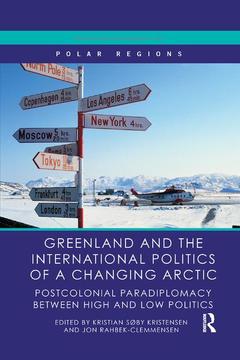Description
Greenland and the International Politics of a Changing Arctic
Postcolonial Paradiplomacy between High and Low Politics
Routledge Research in Polar Regions Series
Coordinators: Kristensen Kristian Søby, Rahbek-Clemmensen Jon
Language: English
Subjects for Greenland and the International Politics of a Changing...:
Keywords
Arctic Council; greenland; Greenlandic Politicians; arctic politics; Ilulissat Declaration; the arctic; high north; Greenlandic Identity; high north politics; Arctic States; high north interantional relations; UN; international relations; Greenlandic Government; greenland and international relations; Arctic Ocean’s Coastal States; polar studies; Thule Air Base; polar regions; Home Rule Government; Chinese Investments; Greenlandic Independence; Russian Flag Planting; Inuit Identity; Independent Greenland; Secretary Of State; Arctic Geopolitics; Colonial Administration; AEPS; Greenlandic Society; Greenland’s Future; Arctic Sea Routes; Arctic Strategy
Publication date: 07-2019
· 15.6x23.4 cm · Paperback
Publication date: 10-2017
· 15.6x23.4 cm · Hardback
Description
/li>Contents
/li>Biography
/li>
Greenland and the International Politics of a Changing Arctic examines the international politics of semi-independent Greenland in a changing and increasingly globalised Arctic. Without sovereign statehood, but with increased geopolitical importance, independent foreign policy ambitions, and a solidified self-image as a trailblazer for Arctic indigenous peoples? rights, Greenland is making its mark on the Arctic and is in turn affected ? and empowered ? by Arctic developments.
The chapters in this collection analyse how a distinct Greenlandic foreign policy identity shapes political ends and means, how relations to its parent state of Denmark is both a burden and a resource, and how Greenlandic actors use and influence regional institutional settings as well as foreign states and commercial actors to produce an increasingly independent ? if not sovereign ? entity with aims and ambitions for regional change in the Arctic.
This is the first comprehensive and interdisciplinary examination of Greenland?s international relations and how they are connected to wider Arctic politics. It will be essential reading for students and scholars interested in Arctic governance and security, international relations, sovereignty, geopolitics, paradiplomacy, indigenous affairs and anyone concerned with the political future of the Arctic.
Introduction: Greenland and the International Politics of a Changing Arctic: Postcolonial Paradiplomacy between High and Low Politics 1. Setting the Scene in Nuuk: Introducing the Cast of Characters in Greenlandic Foreign Policy Narratives 2. Independence through International Affairs: How Foreign Relations Shaped Greenlandic Identity Before 1979 3. Greenlandic Sovereignty in Practice: Uranium, Independence, and Foreign Relations in Greenland between Three Logics of Security 4. The Arctic Turn: How did the High North become a Foreign and Security Policy Priority for Denmark? 5. Lightning Rod: US, Greenlandic and Danish Relations in the Shadow of Post-colonial Reputations 6. Chinese Investments in Greenland: Promises and Risks as Seen from Nuuk, Copenhagen and Beijing 7. The Politics of Economic Security: Denmark, Greenland and Chinese Mining Investment 8. The Divergent Scalar Strategies of the Greenlandic Government and the Inuit Circumpolar Council 9. Greenland and the Arctic Council: Subnational Regions in a Time of Arctic Westphalianisation 10. Materialising Greenland within a Critical Arctic Geopolitics Conclusion: The Opportunities and Challenges of Greenlandic Paradiplomacy
Kristian Søby Kristensen is Deputy Director and Senior Researcher at the Center for Military Studies, Department of Political Science, University of Copenhagen. With a background in international relations, his academic interests are war and strategy, Arctic politics, Danish and European security and defence policy as well as issues of public safety and security.
Jon Rahbek-Clemmensen is Assistant Professor at the Department of Political Science and Public Management at the University of Southern Denmark, where he is affiliated to the Center for War Studies. He holds a PhD in international relations (LSE) and has been affiliated to Columbia University and CSIS. His research interests include European security, Arctic politics, Danish foreign and security policy, and civil–military relations.




